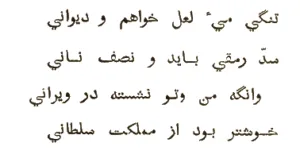Then I attempt to ease my own malaise,
and thus death-pale, fatigued and torn apart,
I go to glimpse you, hopeful I’ll be whole.
And if I lift my eyes so I can gaze,
a seismic shaking starts within my heart
that chases from my pulse my very soul.[Poscia mi sforzo, ché mi voglio atare;
e così smorto, d’onne valor voto,
vegno a vedervi, credendo guerire:
e se io levo li occhi per guardare,
nel cor mi si comincia uno tremoto,
che fa de’ polsi l’anima partire.]Dante Alighieri (1265-1321) Italian poet
La Vita Nuova [Vita Nova; New Life], ch. 16 / Sonnet 7, ll. 9-14 (c. 1294, pub. 1576) [tr. Frisardi (2012), ch. 9]
(Source)
Dante gets his courage up to approach his beloved Beatrice, only to be gobsmacked by her gaze.
(Source (Italian)). Alternate translations:At length I make an effort for relief,
And so, all pale and destitute of power,
I come to gaze on you, in hope of cure:
And if I raise the eyes that I may look,
A trembling at my heart begins, so dread,
It makes the soul take flight from every vein.
[tr. Lyell (1845)]And then if I, whom other aid forsook,
Would aid myself, and innocent of art
Would fain have sight of thee as a last hope,
No sooner do I lift mine eyes to look
Than the blood seems as shaken from my heart,
And all my pulses beat at once and stop.
[tr. Rossetti (c. 1847; 1899 ed.)]Then I resolve, -- this shall no longer be,
And come to seek thee, all amort and pale,
Thinking by sight of thee to cure my pain;
But when I lift mine eyes to look on thee,
My heart within my bosom begins to quail,
And my perturbed soul takes flight from every vein.
[tr. Martin (1862)]Then to mine aid I summon up my strength,
And so, all pale, and empty of defence,
I seek thy sight, thinking to be made whole;
And if to look I lift mine eyes at length,
Within my heart an earthquake doth commence,
Which from my pulses driveth out the soul.
[tr. Norton (1867), ch. 16]To aid me then my forces I renew
And pallid, all my courage drained long since,
I come to you to remedy my plight;
But if I raise my eyes to look at you
So vast a tremor in my heart begins
My beating pulses put my soul to flight.
[tr. Reynolds (1969)]Hoping to help myself, I gather courage
And pale, drawn, lacking all defense
I come to you expecting to be healed;
But if I raise my eyes to look at you
An earthquake starts at once within my heart
And drives life out and stops my pulses' beat.
[tr. Musa (1971)]With hope of help to come I gather courage,
and deathly languid, drained of all defenses,
I come to you expecting to be healed;
and if I raise my eyes to look at you,
within my heart a tremor starts to spread,
driving out life, stopping my pulses’ beat.
[tr. Hollander (1997), sec. 9-10]I renew my strength, because I wish for help,
and pale like this, all my courage drained,
come to you, believing it will save me:
and if I lift my eyes to gaze at you
my heart begins to tremble so,
that from my pulse the soul departs.
[tr. Kline (2002)]Then I make an effort, because I want to defend myself:
and thus, wan and drained of all strength,
I come to see you, thinking I will recover:
but if I raise my eyes to look at you,
such a great trembling begins in my heart
that it makes my soul desert my heartbeats.
[tr. Appelbaum (2006)]
Quotations about:
beloved
Note not all quotations have been tagged, so Search may find additional quotes on this topic.
Whenever mortals fall in love,
if they should happen to meet with fine lovers,
there is no greater joy than this.[ὅσοι γὰρ εἰς ἔρωτα πίπτουσιν βροτῶν,.
ἐσθλῶν ὅταν τύχωσι τῶν ἐρωμένων,.
οὐκ ἔσθ’ ὁποίας λείπεται τόδ’ ἡδονῆς.]Euripides (485?-406? BC) Greek tragic dramatist
Andromeda [Ανδρομέδα], frag. 138 (TGF) (412 BC) [tr. Wright (2017)]
(Source)
One of the first recorded uses of the phrase "fall in love [εἰς ἔρωτα πίπτειν]."
Nauck frag. 138, Barnes frag. 24, Musgrave frag. 12. (Source (Greek)). Alternate translations:They who by love are caught, and fix their love
On virtuous objects; to complete their bliss,
Can need no new accession of delight.
[tr. Wodhall (1809)]When it befalls poor mortal men to love,
Should they find worthy objects for their loving,
There is no fuller joy on earth to long for.
[Source]
Is there any stab as deep as wondering where and how much you failed those you love?
Florida Scott-Maxwell (1883-1979) American-British playwright, author, psychologist
The Measure of My Days (1968)
(Source)
We do not easily think ill of those whom we love most, and the taint of suspicion cannot exist along with warm affection.
[Non enim facile de his quos plurimum diligimus turpitudinem suspicamur, nec in vehementi dilectione turpis suspitionis labes potest inesse.]
Peter Abelard (1079-1142) French philosopher, theologian, logician [Pierre Abélard]
Historia Calamitatum Mearum [The Story of My Misfortunes], ch. 6 (1132) [tr. Radice (1974)]
(Source)
On how Heloise' uncle, Fulbert, had no suspicion of her romantic relationship with Abelard.
(Source (Latin)). Alternate translation:Indeed we do not easily suspect shame in those whom we most cherish, nor can there be the blot of foul suspicion on devoted love.
[tr. Bellows (1922)]
The first half of the sentence is most commonly quoted. Other variants include:
- "For it is not easy to suspect vileness in those whom we love most."
- "For we do not easily expect evil of those whom we love most."
The choicest garb, the sweetest grace,
Are oft to strangers shown;
The careless mien, the frowning face,
Are given to our own.
We flatter those we scarcely know,
We please the fleeting guest,
And deal full many a thoughtless blow
To those who love us best.Ella Wheeler Wilcox (1850-1919) American author, poet, temperance advocate, spiritualist
Poem (1896-10), “Life’s Scars,” st. 3, Frank Leslie’s Popular Monthly, Vol. 42, No. 4
(Source)
Originally published in Frank Leslie's Popular Monthly, Vol. 42, #4 (1896-10)
E’en like two little bank-dividing brooks,
That wash the pebbles with their wanton streams,
And having ranged and searched a thousand nooks,
Meet both at length in silver-breasted Thames,
Where in a greater current they conjoin:
So I my Best-Belovèd’s am; so He is mine.
Perhaps we need, for worldly success, virtues which make us loved and vices which make us feared.
[Peut-être, pour les succès du monde, faut-il des vertus qui fassent aimer, et des défauts qui fassent craindre.]
Joseph Joubert (1754-1824) French moralist, philosopher, essayist, poet
Pensées [Thoughts], ch. 9 “De la Sagesse, de la Vertu, etc. [On Wisdom and Virtue],” ¶ 26 (1850 ed.) [tr. Collins (1928), ch. 8]
(Source)
(Source (French)). Alternate translations:Perhaps, for worldly success, we ought to have virtues that make us beloved, and faults that make us feared.
[tr. Lyttelton (1899), ch. 8, ¶ 21]
The sweetest Musick is the Sound of her Voice whom we love.
[L’harmonie la plus douce est le son de voix de celle que l’on aime.]
Jean de La Bruyère (1645-1696) French essayist, moralist
The Characters [Les Caractères], ch. 3 “Of Women [Des Femmes],” § 10 (3.10) (1688) [Bullord ed. (1696)]
(Source)
(Source (French)). Alternate translations:The sweetest Musick, the Sound of her Voice whom we love.
[Curll ed. (1713)]The sweetest Musick the Voice of her whom we love.
[Browne ed. (1752)]The sweetest music is the sound of the voice of the woman we love.
[tr. Van Laun (1885)]The sweetest music is the sound of the voice of her whom we love.
[tr. Lee (1903)]No harmony is sweeter than the sound of a loved one's voice.
[tr. Stewart (1970)]
Love me, love my dog.
John Heywood (1497?-1580?) English playwright and epigrammist
Proverbes, Part 2, ch. 9 (1546)
(Source)
Earlier noted as a common proverb by Bernard of Clairvaux in the 11th Century: "Qui me amat, amet et canem meum [Who loves me will love my dog also] in his First Sermon on the Feast of St Michael.
A Book of Verses underneath the Bough,
A Jug of Wine, a Loaf of Bread — and Thou
Beside me singing in the Wilderness —
Oh, Wilderness were Paradise enow.
Omar Khayyám (1048-1123) Persian poet, mathematician, philosopher, astronomer [عمر خیام]
Rubáiyát [رباعیات], Bod. # 149 [tr. FitzGerald, 3rd ed. (1872), # 12]
(Source)
Fitzgerald used the same translation for his 4th and 5th ed.
There are at least two close variants of this quatrain (Bodleian 149 and 153). Both introduce the wine, maybe the bread or meat, some verse, and a love interest. In the first variant, in some cases, the setting is in the wilderness which is turned to a virtual Paradise by the accoutrements; in the second case, the other factors turn the writer's mind away from Paradise itself. In the second variant, these items all brought together are valued more highly than the wealth of the Sultan. Some translators blend these together, others break them out in two (or three!) quatrains. While concordances (especially in the 19th Century) draw connections, they sometimes contradict. I have included them all here, for the reader to discern their own differences.
Alternate translations:Some ruby wine and a diwan of poems,
A crust of bread to keep the breath in one's body,
And thou and I alone in a desert, --
Were a lot beyond a Sultan's throne.
[tr. Cowell (1858), # 13]Here with a Loaf of Bread beneath the Bough,
A Flask of Wine, a Book of Verse -- and Thou
Beside me singing in the Wilderness --
And Wilderness is Paradise enow.
[tr. FitzGerald, 1st ed. (1859), # 11]Here with a little Bread beneath the Bough,
A Flask of Wine, a Book of Verse -- and Thou
Beside me singing in the Wilderness --
Oh, Wilderness were Paradise enow!
[tr. FitzGerald, 2nd Ed (1868), # 12]In Spring time I love to sit in the meadow with a paramour perfect as a Houri and goodly jar of wine, and though I may be blamed for this, yet hold me lower than a dog if ever I dream of Paradise.
[tr. McCarthy (1888), # 177]When the hand possesses a loaf of wheaten bread, two measures of wine, and a piece of flesh, when seated with tulip-cheeks in some lonely spot, behold such joy as is not given to all sultans.
[tr. McCarthy (1888), # 398]Give me a flagon of red wine, a book of verses, a loaf of bread and a little idleness. If with such store I might sit by thy dear side in some lonely place, I should deem myself happier than a king in his kingdom.
[tr. McCarthy (1888), #449]In the sweet spring a grassy bank I sought
And thither wine and a fair Houri brought;
And, though the people called me graceless dog,
Gave not to Paradise another thought!
[tr. Whinfield (1883), # 84]Give me a skin of wine, a crust of bread,
A pittance bare, a book of verse to read;
With thee, love, to share my lowly roof,
I would not take the Sultan's realm instead!
[tr. Whinfield (1883), # 452]A Flask of Wine, a book, a Loaf of Bread, --
To every Care and Worldly Sorrow dead,
I covet not, when thou, oh Love, art near,
The Jeweled Crown upon the Sultan's Head.
[tr. Garner, 1.8 (1888)]Yes, Loved One, when the Laughing Spring is blowing,
With Thee beside me and the Cup o’erflowing,
I pass the day upon this Waving Meadow,
And dream the while, no thought on Heaven bestowing.
[tr. Garner, 1.20 (1888)]A flask of red wine, and a volume of song, together --
Half a loaf, -- just enough the ravage of Want to tether:
Such is my wish -- then, thou in the waste with me --
Oh! sweeter were this than a monarch's crown and feather!
[tr. M. K. (1888)]In the Springtime, biding with one who is houri-fair,
And a flask of wine, if 't is to be had -- somewhere
On the tillage's grassy skirt -- Alack ! though most
May think it a sin, I feel that my heaven is there!
[tr. M. K. (1888)]A book, a woman, and a flask of wine:
The three make heaven for me; it may be thine
Is some sour place of singing cold and bare --
But then, I never said thy heaven was mine.
[tr. Le Gallienne (1897)]A book, a flask of wine, a crust of bread,
To every care and worldly sorrow dead,
I covet not when thou, oh, Love, art near,
The jeweled turban on the sultan's head.
[tr. Garner (1898), # 8]A gugglet of wine and a book of poesy,
The haf of a loaf of bread and a penny fee,
And I in a nook of some ruin seated with thee,
Were better than king on a kingdom's throne to be.
[tr. Payne (1898), # 829]I desire a little ruby wine and a book of verses,
Just enough to keep me alive, and half a loaf is needful;
And then, that I and thou should sit in a desolate place
Is better than the kingdom of a sultan.
[tr. Heron-Allen (1898), # 149]If a loaf of wheaten-bread be forthcoming,
a gourd of wine, and a thigh-bone of mutton, and then,
if thou and I be sitting in the wilderness, --
that would be a joy to which no sultan can set bounds.
[tr. Heron-Allen (1898), # 155]A book of verses underneath the vine,
A loaf of bread, a jug of ruby wine,
And thou beside me, resting in the wild,
Would make the dreary wilderness divine!
[tr. Roe (1906), # 25]A skin of red wine, book of poesy.
Bread, a half loaf, enough for life give me.
Then sitting in some solitude with thee
Were sweeter than the Sultan's empery!
[tr. Thompson (1906), # 560]If bread you have made from the grain of wheat,
Two maunds of wine, a mutton joint for meat,
In some nook sitting with fair Tulip-cheeks,
Not every Sultan hath such joy complete!
[tr. Thompson (1906), # 586]Give me a scroll of verse, a little wine,
With half a loaf to fill thy needs and mine,
And with the desert sand our resting place,
For ne'er a Sultan's kingdom would we pine.
[tr. Talbot (1908), # 149]Let Fortune but provide me bread of wheat,
A gourd of wine, a bone of mutton sweet,
Then in the desert if we twain might sit,
Joys such as ours no Sultan could defeat.
[tr. Talbot (1908), # 155]If we get but a loaf of wheaten-bread, a gourd of wine
and a leg of mutton.
and if I and thou be sitting in the wilderness, that
were a treat beyond the powers of most sultans.
[tr. Christensen (1927), # 28]If you have a loaf made from the marrow of wheat,
Of wine two gallons and of lamb a joint,
And if you are sitting in the wilderness with one whose face is beautiful like the moon.
That would be bliss not attainable by a Sultan.
[tr. Rosen (1928), # 320]If one could find a loaf of grinded wheat,
And with a gourd of wine and chop of meat
Retires to ruined haunts with Beloved One,
What king can hope to find such joyous treat?
[tr. Tirtha (1941), # 7.131]The Word suffices and a book of songs,
A crumb will fill this what to earth belongs;
In solitude when I would pore on Tee,
I care no kingdoms, neither thrones nor throngs.
[tr. Tirtha (1941), # 8.131]Should our day's portion be one mancel loaf,
A haunch of mutton and a gourd of wine
Set for us two alone on the wide plain,
No Sultan's bounty could evoke such joy.
A gourd of red wine and a sheaf of poems --
A bare subsistence, half a loaf, not more --
Supplied us two alone in the free desert:
What Sultan could we envy on his throne?
[tr. Graves & Ali-Shah (1967), # 11-12]If one may have a loaf of the flower of wheat, a two-maund (jar) of wine, a thigh of mutton, seated with a heart's darling in a ruined place -- that is a pleasure that is not the attainment of any sultan.
[tr. Bowen (1976), # 12a]If we were seated in a desert place,
Where I alone might gaze upon your face,
These simple victuals would our needs suffice:
A thigh of mutton in a dish of rice;
A loaf of bread of finest wheaten flour;
A flagon tall from which cool wine to pour ...
There, in the day's long leisurely decline,
No Sultan's pleasures could compare with mine.
[tr. Bowen (1976), # 12b]I need a jug of wine and a book of poetry,
Half a loaf for a bite to eat,
Then you and I, seated in a deserted spot,
Will have more wealth than a Sultan's realm.
[tr. Avery/Heath-Stubbs (1979), # 98]If chance supplied a loaf of white bread,
Two casks of wine and a leg of mutton,
In the corner of a garden with a tulip-cheeked girl,
There'd be enjoyment no Sultan could outdo.
[tr. Avery/Heath-Stubbs (1979), # 234]In spring if a houri-like sweetheart
Gives me a cup of wine on the edge of a green cornfield,
Though to the vulgar this would be blasphemy,
If I mentioned any other Paradise, I'd be worse than a dog.
[tr. Ememai (1988), # 160]Ah, would there were a loaf of bread as fare,
A joint of lamb, a jug of vintage rare,
And you and I in wilderness encamped --
No Sultan's pleasure could with ours compare.
[tr. Saldi (1991), # 16]
The supreme happiness of life is the conviction that we are loved; loved for ourselves — say rather, loved in spite of ourselves.
[Le suprême bonheur de la vie, c’est la conviction qu’on est aimé; aimé pour soi-même, disons mieux, aimé malgré soi-même.]
Victor Hugo (1802-1885) French writer
Les Misérables, Part 1 “Fantine,” Book 5 “The Descent,” ch. 4 (1.5.4) (1862) [tr. Wilbour (1862)]
(Source)
(Source (French)). Alternate translations:The supreme happiness of life is the conviction of being loved for yourself, or, more correctly speaking, loved in spite of yourself.
[tr. Wraxall (1862)]The greatest happiness of life is the conviction that we are loved -- loved for ourselves, or rather, loved in spite of ourselves.
[E.g. (1873)]The supreme happiness of life consists in the conviction that one is loved; loved for one's own sake -- let us say rather, loved in spite of one's self.
[tr. Hapgood (1887)]The supreme happiness in life is the assurance of being loved; of being loved for oneself, even in spite of oneself.
[tr. Denny (1976)]The supreme happiness of life is the conviction that we are loved; loved for ourselves -- say rather, loved in spite of ourselves.
[tr. Wilbour/Fahnestock/MacAfee (1987)]The supreme happiness of life is the conviction that you are loved, loved for yourself, better still, loved despite yourself.
[tr. Donougher (2013)]













